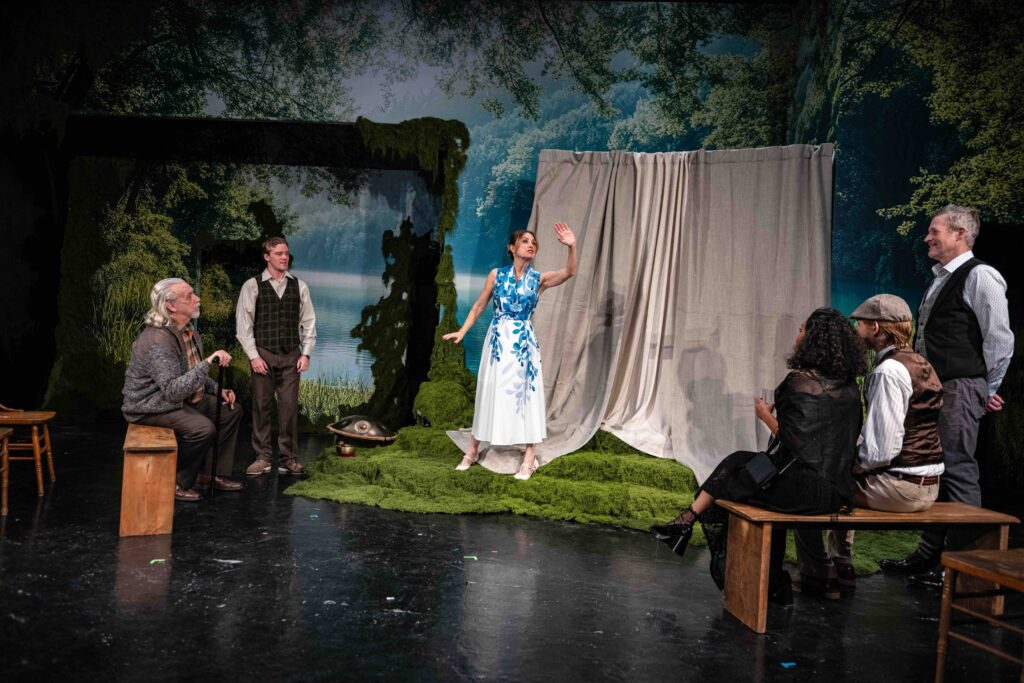Review: The Seagull

| Location | 2055 S Sepulveda Blvd, Los Angeles, CA 90025 |
| Theater | The Odyssey Theatre, Los Angeles |
| Date of Performance | January 18, 2025 |
| Language(s) | English (translated from Russian) |
| Photos by | Sasha Dawson and Miguel Perez |
Reviewed by Amanda L. Andrei
“We need new forms,” declares Konstantin Treplev, a fledgling playwright and son of an aging actress, of the theatre. “New forms are needed, and if we can’t have them, then we had better have nothing at all.” It’s also through old forms, such as Anton Chekov’s comedy The Seagull, that audience members can contemplate the role of artists and the snares of love. Although Odyssey Theatre Ensemble’s vision of this play contains stylistic twists which belie Chekov’s realism and create an undercurrent of dissonance, the poised portrayals of the iconic Boris Trigorin and Irina Arkadina bolster the tragicomedy.

Dramatist and author Anton Chekov penned The Seagull 130 years ago, with its premiere a year later, in 1896 at the Alexandrinsky Theatre in St. Petersburg, Russia. Set in a lake house and estate in the Russian countryside in the same era, the play served as an opportunity for the turn-of-the-century audiences to see themselves reflected in stark, realistic terms: family dynamics, class differences, and love triangles during a shimmery summer and then two years later, in a thunderstorm.
There’s Irina Arkadina (Sasha Alexander), a theatre actress trying to reclaim her youth and influence, visiting her brother Pyotr Sorin (Joe Hulser), retired official and owner of the lake house. Her son Konstantin (Parker Sack), living under the shadow of his mother and aspiring to be a writer. Boris Trigorin (James Tupper), established writer and paramour of Irina, who falls for the 19-year-old idealistic Nina Zarechnaya (Cece Kelly), a neighbor to the estate who longs to be an actress and in the world of theatre and literati. And then there are multiple other guests, neighbors, and servants who add to the rich texture and intrigue of Russian society.
It would be easy to paint Trigorin as a slimy creep, preying on a teenage Nina for his own base desires and insecurities. But James Tupper is exquisite, inhabiting the role with such innocent presence and care that it’s easy to be seduced by—and sympathetic towards—this romantic writer. Sasha Alexander also fills her Irina with vigor and desperation, drawing bursts of laughter with her comedic timing and commanding rapt attention as she baits Trigorin to return to her arms. Parker Sack as Konstantin offers boyish rebellion, optimism, and moodiness—he shines best during a verbal throwdown with his rapacious mother—though witnessing a more transformative arc towards the end would have been more satisfying and poignant. Performances by Will Dixon as Dr. Dorn, and Carlos Carrasco as the steward Shamrayev, are also notable for the gusto and enthusiasm they bring to these side characters.

by the lake. Photo credit: Miguel Perez.
Part of the trouble with this production is that some of the visual stylistic choices conflict with the realism and era invoked from the text, a translation from 1960 by Ann Dunnigan. The translation itself is clear, and occasionally feels dated with its exclamations and endearments (“Fiddlesticks!” “Little one!”), but the dated feeling seems to come more from the ambiguity around time and place within the production. It’s unclear what the time period is: costumes and props verge on the modern, and small details like sunglasses, a camouflage outfit, and a ballpoint pen impart anachronistic touches that distract. The sprawling moss and large aquamarine lake in the background (cleverly designed by Carlo Maghirang) evoke feelings of immersivity and stagnancy beneath beauty, but also give an expressionistic feeling, as if the house and action symbolically live within the lake, instead of alongside it.
Director Bruce Katzman also crafts some moments of characters freezing in charged moments, creating silent tableaus that adds a touch of strangeness to the production. The choice to get playful and more abstract with The Seagull is a noteworthy one, though it seems the production would benefit from a more modern or updated translation that would allow the creative team to be more flexible with the contemporary design choices and have a more unified vision.
Given the situation with the wildfires, it can be jarring to return to the theatres during this time in L.A. Chekov’s summer vacation world and love entanglements seem far removed from the disaster befalling the City of Angels. But in fact, they hearken to L.A. as the illusory La-la-land, that amidst the luster of the entertainment industry, there are scores of individuals who are dreaming, scheming, and hustling to make a life in the arts. Some motives may be naïve or petty, others heartfelt and sincere.
As Nina tells Konstantin towards the end, after her share of trials and heartbreak,
“I know now, I understand, that in our work, Kostya—whether it’s acting or writing—what’s important is not fame, not glory, not things I used to dream of, but the ability to endure.”
In this time, that endurance is a reminder for every Angeleno.

Ioana Bîrjan (b.1997) is the author of Vârsta Iubirii which translates into English as The Age of Love (Heyday Books, 2023). The novel is inspired by the Lady of the Camellias and the opera La traviata. She earned a bachelor’s degree from the Faculty of Letters, Ovidius University of Constanța, where she is now a graduate student in the Romanian Studies program.
Read more of her work in magazines, in anthologies, and on her blog: https://scrierileioanei.wordpress.com/
SUPPORT SEEFEST
Not a member yet? Become an art patron with other SEEfest arthouse aficionados in support of great events and programs. Our mission is to keep you informed about initiatives from our wide network of fellow cultural organizations.
We Welcome YOU!

